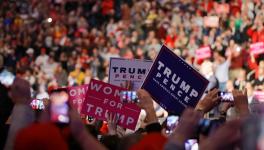Trump Sets Israeli Cat Among Arab Pigeons
Iranian military delegation led by Defence Minister Gen. Amir Hatami examining Russian weaponry, Moscow, August 24, 2020
The US President Donald Trump’s legacy in the Middle East is going to be that he scattered the region’s Arab unity once and for all. What the successive waves of Cold War, oil, petrodollar, terrorism, political Islam or the Arab Spring couldn’t achieve, Trump managed in less than 3 years. With the artificial insemination of the Arab womb with the Israeli sperm, he has precipitated a catastrophic miscarriage with fatal consequences. Trump lacks the erudition to comprehend the import of what he has triggered.
Washington, Abu Dhabi and Tel Aviv are struggling to give a decent geopolitical construct to the UAE-Israel ‘peace agreement’. No one can claim that the deal promotes the resolution of the Palestinian problem, which is at the core of the Middle East crisis. The Palestinian nation has condemned the deal as a stab in the back.
The Arab Street is watching with dismay in sullen silence. The three key regional bodies — Organisation of Islamic Conference, Arab League and the Gulf Cooperation Council — have gone into hiding. Even if they mutate and survive, they will be hardly recognisable.
Trump’s agenda is quintessentially Israel’s agenda. Its principal aim is to get for Israel a common regional home. There is a palpable sense of urgency since the US’ capacity to mitigate Israel’s isolation is fast dwindling, while new players have appeared on the scene — regional and extra-regional — who are in no mood to take command from Washington.
The US’ plight in the emerging Middle East is no different from Israel’s. Both enjoy unmatchable military superiority in the region, but their formidable prowess is fast becoming irrelevant. The incipient signs first appeared during the 2006 Israeli invasion of Lebanon and the phenomenon has since appeared across the region. Equally, the US has irretrievably lost its credentials as a mediator. Its attempts to pacify Saudi Arabia, UAE and Qatar failed abysmally.
No one is listening to Washington nowadays. Trump called on Saudi Arabia to step forward and recognise Israel, emulating the Emiratis. Pat came the reply from Prince Turki Al-Faisal — ‘Not until Palestinian refugees return to their homeland.’ The US claimed that Bahrain and Oman are raring to go to recognise Israel. But the US secretary of state Mike Pompeo has had to fly down to Manama to remind the sheikh.
And the jury is still out! The sheikhs are acutely conscious of the seething rage in the Arab street over the betrayal of Palestine by the Emiratis. Ironically, the sheikhs have no qualms about dealing with Israel. The problem is about admitting it.
The Israeli narrative is that a new Middle East realignment is under way — ‘potentially including Egypt, Greece, Cyprus, Israel, the UAE, Bahrain, Oman and eventually Saudi Arabia,’ which will face a ‘very real, opposing coalition, comprising Iran, Turkey, Qatar, and Iranian proxies in Iraq, Syria, Lebanon, Gaza and Yemen, with Jordan and Kuwait for the time being maintaining an uneasy neutral position.’
But all that remains a typical Israeli bravado. No one can coherently explain the raison d’être of such a line-up of regional states in the Eastern Mediterranean and the Middle East. Conceivably, Israel’s hope is that the mantle of leadership of the coalition will fall on it, being the most powerful military power in the pack. But what do the others get out of such an alliance?
Greece and Cyprus are already members of the EU; Greece is also a NATO power. Egypt and the UAE are helping the Assad regime in Syria (which Israel is trying to overthrow.) Why should Israel’s coalition partners share the burden of its hostilities with Iran, Turkey, Qatar, Syria, Lebanon, Hezbollah, Hamas, Fatah, et al?
Again, while Israel’s desire to get embedded in some regional coalition or the other is understandable, Israel must first learn to be a team player. It shuns consensual politics and prefers the John Wayne way. Israel only acts in self-interest and is a hard nut to crack. The US is having a tough time persuading Israel that China doesn’t make a good friend.
Clearly, the Middle East politics is splintering along several fault lines and the UAE-Israel deal accelerates the fragmentation. In the emerging ‘multipolarity’, Israel loses the regional hegemony it used to enjoy.
Hard times lie ahead. As income from oil continues to be grossly insufficient for the petrodollar regimes’ economic well-being and for their rulers to pacify their restive populations, the compact that existed between the rulers and the ruled is going to come under strain. Coronavirus and the deepening economic recession aggravates the breakdown of the political compact.
Turkey’s Erdogan senses this while advancing his project for the democratisation of the repressive Middle Eastern regimes, including Israel. True, an axis is developing between Turkey, Qatar and Iran, which is focused on promoting Islamism as the vehicle of change in the region.
All three countries agree on one point — namely, that political Islam should be the charioteer of change in the Muslim Middle East. Israel can do nothing to stop them or salvage the beleaguered Arab repressive regimes caught in the maelstrom of social and political changes.
All bets are off when — not if — Turkey’s president Recep Erdogan decides that the time has come for his country to resuscitate its nuclear programme. Declassified American archival materials indicate that as far back as 1966, according to reports from US diplomats in Ankara, some Turkish senior officials were interested in a nuclear weapons capability, such as General Refik Tulga who was a participant in the 1960 military coup.
Indeed, Erdogan is on record at least once after coming to power complaining about the Nuclear Nonproliferation Treaty and asking why Turkey did not have nuclear weapons: “This I cannot accept,” he reportedly remarked. And if Turkey proceeds on that path, will the Emiratis and Saudis be far behind?
With the US embargo on arms supplies to Iran expiring on October 4, a new dawn is breaking in regional security. Iran’s Defence Minister Gen. Amir Hatami who is on a visit to Moscow has held discussions with his Russian host Sergei Shoigu. Gen. Hatami has reportedly shown interest in advanced Russian weaponry including S-400 Triumf air defence system, Pantsir S1E combined medium-range surface-to-air missile system, Kamov KA-226T utility helicopter, Sukhoi Su-30 fighter and so on.
The region understands the profound implications of the humiliating defeat that the Trump administration has suffered this week at the UN Security Council on its attempt, at Israel’s prodding, to invoke the ‘snapback’ sanctions against Iran. The regional security scenario is changing dramatically.
Meanwhile, Saudi Arabia is quietly developing a nuclear programme; the Emiratis just commissioned a nuclear power plant and are insisting that their pilots shall fly nothing less than F-35 stealth fighter jets. Reports suggest that Israel feels flustered already.
But the Emirati sheikhs and the House of Saud are not going to be content to remain as Israel’s B Team. They are used to own the best that money can buy. In a very near future, conceivably, Israel will be hard-pressed to explain to them why nuclear weapons, F-35 jets or the Iron Dome should remain its sole prerogative in the Middle East.
Courtesy: Indian Punchline
Get the latest reports & analysis with people's perspective on Protests, movements & deep analytical videos, discussions of the current affairs in your Telegram app. Subscribe to NewsClick's Telegram channel & get Real-Time updates on stories, as they get published on our website.
























